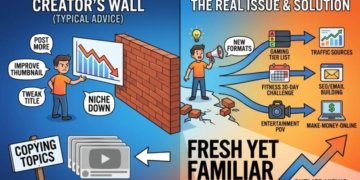The landscape of AI-supported content creation is evolving rapidly. Deep research tools, for example, now offer a new dimension of automated research. This is exciting, not least for content creators in marketing and other areas.
Background: From “world knowledge” to intelligent research
The first generative AI tools only had “world knowledge” at their disposal: This is information that they learned during training. This was sufficient for many applications, but it also entailed considerable limitations: outdated information, inaccuracies and the problem of hallucination when AI systems invent answers because they lack the necessary knowledge.
The integration of web search functions into AI assistants was a first step forward. This allows the digital assistants to retrieve up-to-date information on the web and back up their statements with sources.
Deep research tools now go a decisive step further: they act as autonomous research agents that can also process complex tasks independently.
Functionality and range of services
Deep research tools first develop a plan on how best to tackle the research task at hand. They then systematically search multiple sources, analyze the information found and derive further search directions. This process can take between a few minutes and half an hour, which is significantly longer than conventional AI answers.
However, the result also goes far beyond a typical AI answer: a report is created that can comprise several thousand words and contains structured texts with subheadings, tables, graphics, images and detailed source information. Users can follow the research process in real time or see afterwards which sources the AI has consulted.
Application in content creation
For marketing professionals and content creators, deep research tools open up new opportunities to improve the quality of their content. “Many teams only see AI as a way to produce content faster. However, this is a short-sighted approach because it makes your own content interchangeable and forgettable,” explains Jan Tissler. The experienced journalist and publisher has tried out and compared the deep research offerings from ChatGPT, Google and Perplexity, among others, for his own work: https://smartcontentreport.com/deep-research-tools-comparison/
Instead of relying on faster content production, these tools can be used to create well-founded, fact-rich content that shines with comprehensive information from various sources.
The reports from these services are suitable for providing an introductory overview and are also useful for researching facts, figures, quotes and examples that can be used to greatly enhance existing content.
Jan Tissler has published an introduction to how ChatGPT Deep Research and others can be used in marketing: https://smartcontentreport.com/chatgpt-deep-research-marketing/
Limits and quality assurance
Despite their power, deep research tools are not error-free. As with other AI applications, they can misunderstand information or continue to invent it. “It is therefore absolutely essential to check the researched information,” explains Jan Tissler.
He recommends using the respective deep research report as a starting point, just as you would with a Wikipedia article, for example.
Availability and market development
Following the pioneer ChatGPT, several providers have now integrated deep research tools into their platforms. Jan Tissler provides an overview of the five most important deep research tools on his Smart Content Report page, explaining their strengths and weaknesses as well as their availability and pricing models: https://smartcontentreport.com/deep-research-tools-comparison/
CONTENTMEISTER LLC
2850 Calle de Oriente
Santa Fe, NM 87507
United States
Jan Tissler (he/him)
Smart Content Report is a website and newsletter on the topic of AI. German journalist and online publisher Jan Tissler has been following the exciting and rapid developments in this industry since January 2024, particularly from a content marketing perspective. He uses AI himself and documents the prompts he uses on the website, among other things. The website and newsletter are published in German and English.
Smart Content Report is a service offered by UPLOAD Magazin, the major German-language specialist publication and learning platform for content marketing. Jan Tissler publishes it together with the experienced content professional Falk Hedemann.
Jan Tissler has more than 30 years of professional experience, 25 of them online. After a comprehensive apprenticeship at Burda Media, he worked in various positions as an online editor and editorial manager, while also implementing his own ideas on the Internet. Born in Hamburg, Germany, he now lives at the southern tip of the Rocky Mountains in Santa Fe, New Mexico.
This release was published on openPR.










